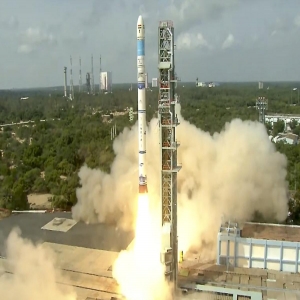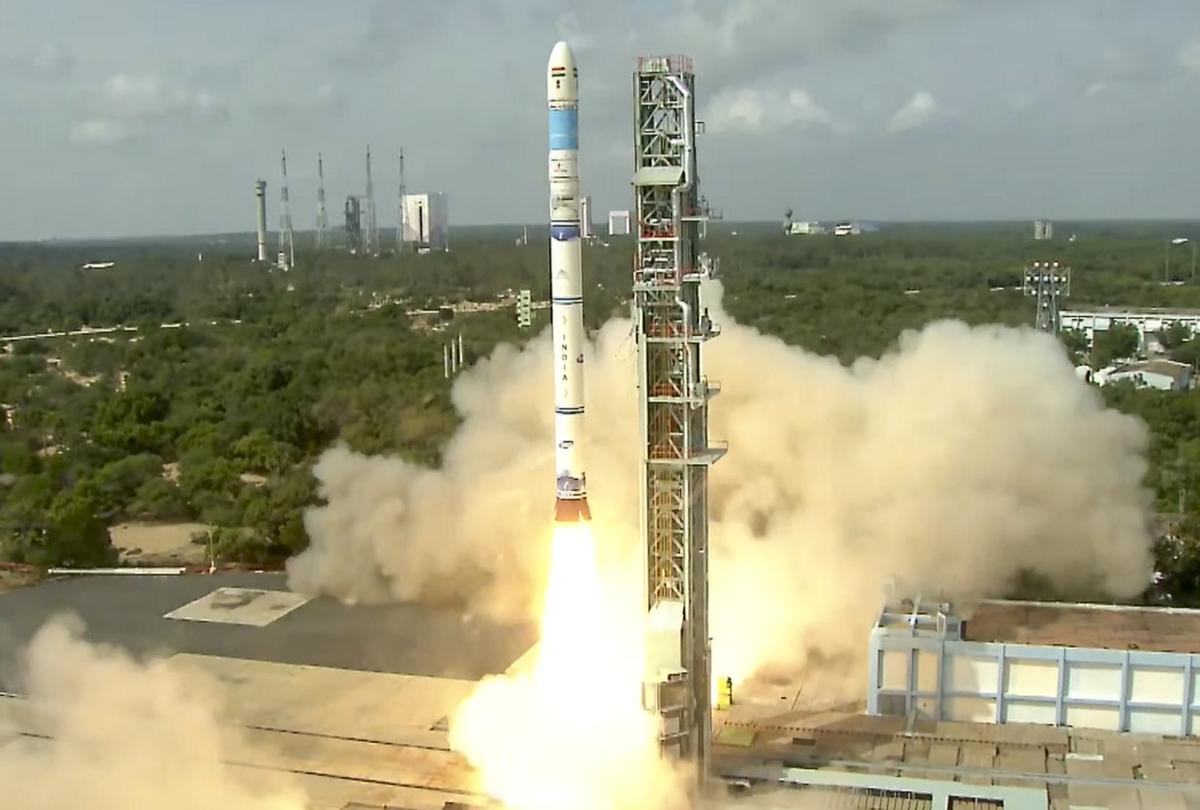
.png) M L Satyan
M L Satyan

Whenever I hear about tragic news, such as road, rail, and air accidents, human and property loss due to war, violence, cyclones, floods, and earthquakes, I wonder if the Earth is a safe place to live. The role of science and technology is supposed to be for the benefit of the people. They are to be employed to protect from various human-induced and natural disasters.
The Indian space program encompasses research in multiple areas, such as astronomy, astrophysics, planetary and earth sciences, atmospheric sciences, and theoretical physics, supported by scientific balloons, sounding rockets, space platforms, and ground-based facilities.
The important science missions of the Indian Space Research Organization (ISRO) include Astronomy Missions, Chandrayaan-1, Mars Orbiter Mission, AstroSat, Chandrayaan-2, Chandrayaan-3, Aditya-L1, and XPoSat. On January 29, 2025, ISRO launched the GSLV-F15 rocket carrying the NVS-02 satellite. This marked its 100th rocket launch from the Satish Dhawan Space Centre, Sriharikota.
Indeed, ISRO's commendable works and achievements make all Indians proud. However, is our Earth in a liveable condition? I give two recent examples.
Water pollution: On January 29, 2025, Aam Aadmi Party's national convener Arvind Kejriwal told the Election Commission that his remarks—accusing the Haryana Government of poisoning the Yamuna—were made in the context of an urgent and alarming public health crisis concerning the deteriorating quality of drinking water in Delhi.
"Ammonia levels continue to be 6 times above normal in Yamuna waters, at the point it is entering Delhi from Haryana. Such levels are extremely toxic for the human body. This water cannot be treated and supplied to the people of Delhi. Otherwise, their lives will be at risk," said the Delhi Chief Minister.
Stampede deaths: As per the official news, 30 people have died, and 60 more are injured after a "stampede-like" situation broke out at the Maha Kumbh Mela in Uttar Pradesh's Prayagraj in the early hours of January 29, 2025. While 25 victims have been identified, the injured are undergoing treatment at the local medical college. Unofficially, the number of people who died and injured could be more.
According to government officials and witnesses, when the pilgrims rushed to the confluence of the Ganges and Yamuna rivers, which Hindus consider sacred, thousands of people who were sleeping on the river banks were trampled, safety barricades were broken, and fences were pulled down. Others were trying to escape after bathing, adding to the chaos.
As per the news reports, about 40 crore people were expected to visit the Maha Kumbh Mela venue. This tragedy is clear evidence of a lack of effective safety measures to protect the pilgrims. As per some media channels, the special and elaborate arrangements made for the VIPs also caused a lot of inconvenience and health problems for the devotees. Interestingly, we have had a history of stampedes during Kumbh Melas in 1954, 1986 and 2003, killing hundreds of pilgrims.
The examples of Yamuna water pollution and stampede, both past and present, show the contrast between our space research/scientific advancement and the grassroots tragedies. I do not undermine science, technology, space research, etc. They are all important. The pertinent question is whether all these—science, technology, and space research—create a conducive atmosphere for us to live safely here on Earth.
Every year, India witnesses intensified weather patterns, with incessant rainfall following closely on the heels of an intense heatwave that affects various parts of the country. While various factors contribute to flooding, the experts point to climate change resulting from global warming as a significant driver of increased occurrences of heavy rainfall.
Some environmentalists point to our "zero disaster-preparedness." The never-ending "blame game" among the political parties and between the federal and state governments goes on. Whatever is said and done, the bitter truth is that India lacks disaster preparedness. We have poor and inadequate infrastructure at every level.
Other environmental-threatening problems, such as land and soil degradation, water degradation, atmospheric degradation, and several other kinds of pollution, such as noise and light pollution, are also part of environmental degradation.
At this stage, we need to raise certain fundamental questions:
1. How can we boast about sending satellites to different planets when we do not know how to protect ourselves from natural calamities like earthquakes, cyclones and floods?
2. Why is our disaster preparedness/management abysmal?
3. Why should innocent people die due to a lack of adequate safety measures in pilgrim centres/venues?
4. Should not our scientists, who are experts in researching different planets, set up an effective disaster management system?
5. When our villages, towns, and cities are not conducive to safe living, why should we spend crores of rupees on space research and activities?
6. When we have control over space, why do we keep losing our land in the Indian territories to the neighbouring countries?
7. Why is our weather forecast inaccurate and fails to give timely warnings to the people?
8. Are the ISRO scientists not aware of the ground-level problems that they themselves face every day?
It is time for policymakers, federal/state governments, scientists, software technologists, and research institutes to examine the ground realities and current problems that ordinary people face daily. They must realise that every sector needs appropriate preventive systems to ensure a safe environment for SAFE LIVING HERE ON EARTH.